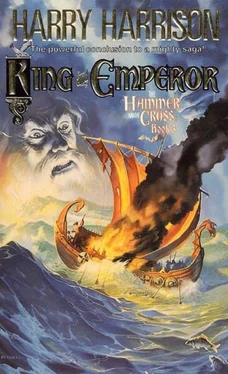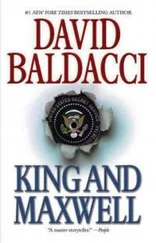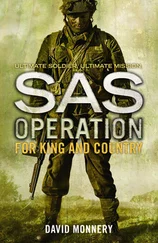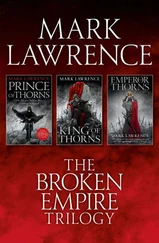Гарри Гаррисон - King and Emperor
Здесь есть возможность читать онлайн «Гарри Гаррисон - King and Emperor» весь текст электронной книги совершенно бесплатно (целиком полную версию без сокращений). В некоторых случаях можно слушать аудио, скачать через торрент в формате fb2 и присутствует краткое содержание. Год выпуска: 1996, ISBN: 1996, Жанр: Альтернативная история, Юмористическая фантастика, на английском языке. Описание произведения, (предисловие) а так же отзывы посетителей доступны на портале библиотеки ЛибКат.
- Название:King and Emperor
- Автор:
- Жанр:
- Год:1996
- ISBN:0-812-53646-0
- Рейтинг книги:3 / 5. Голосов: 1
-
Избранное:Добавить в избранное
- Отзывы:
-
Ваша оценка:
- 60
- 1
- 2
- 3
- 4
- 5
King and Emperor: краткое содержание, описание и аннотация
Предлагаем к чтению аннотацию, описание, краткое содержание или предисловие (зависит от того, что написал сам автор книги «King and Emperor»). Если вы не нашли необходимую информацию о книге — напишите в комментариях, мы постараемся отыскать её.
Rome threatens Shef's fearsome Viking navy with a new invention of unparalleled destruction: Greek fire. Unable to defend his fleet against this awesome weapon, Shef travels East in search of new wisdom. His quest leads him to the lavish court of the Muslim Caliph and, ultimately, to the secret hiding place of the Holy Grail.
King and Emperor — читать онлайн бесплатно полную книгу (весь текст) целиком
Ниже представлен текст книги, разбитый по страницам. Система сохранения места последней прочитанной страницы, позволяет с удобством читать онлайн бесплатно книгу «King and Emperor», без необходимости каждый раз заново искать на чём Вы остановились. Поставьте закладку, и сможете в любой момент перейти на страницу, на которой закончили чтение.
Интервал:
Закладка:
There was something there in the middle of the boat. Halim could not see clearly what it was, but he could see some metal contrivance, like a copper dome, lit brilliantly not only by the rising sun but by some flare or flame beneath it. Across the water, over the hiss of the oars and the blare of trumpets, came a roaring noise like that of some great beast, cut by a high and eldritch whistle. He could see two men pumping desperately at a handle, two more leveling a nozzle over the side.
Greek ships and the Greek fire. Halim had heard of this weapon, but never seen it. Few men who saw it lived to say how it should be countered. Yet he had heard one thing, which was that if its crew could be killed or distracted while they prepared its action, then it became as dangerous to its own side as to the enemy.
Halim began to shout orders to the Turks in his own craft, wishing vainly as he did so that he could shout the same warning to the hundred ships streaming in his wake, to attack, he could now see, no more than a score of the Byzantines.
As the breath filled his lungs, and the first arrows began to fly, the whistle in Halim's ears rose to a shriek, a barked command came from the vessel lunging towards him. Halim saw the nozzle swing to face him, caught a strange reek in the air, saw a glow at the mouth of the nozzle. Then the air was full of fire, searing out his eyeballs, crisping his skin so that pain struck him like a club from all directions at once. Halim breathed in death as he tried to scream, his lungs filling instantly with flame. As he fell back into the blaze that was his flagship he heard the simultaneous agony of a hundred slaves, and took it with the last flick of consciousness as the tribute for the entry of a warrior into Paradise.
The Tulunid scout boats, creeping cautiously into the water where their fleet had been barely three days before, found nothing to explain its disappearance. Except charred timbers floating, the headless corpse of a circumcised believer who had survived the burning only to meet death for refusing baptism. And still chained to the timber he had pulled free from his sunken ship in a frenzy of fear, a slave half mad with thirst. The story he croaked out sent the scout boats racing without further delay for the Egyptian shore.
News of the disaster did not outsail the fleet that caused it. A bare fortnight later, Ma'mun bin-Khaldun, commander of the faithful on the new-conquered island of Mallorca, could only watch grimly from the shore as the Byzantine fleet brushed aside the attempts at interception by his own always-manned inshore squadron, and then cruised slowly along the ranks of his massed invasion fleet, moored a hundred feet offshore, pouring out their Iblis-flame. His army had debarked months before, to set about the conquest of the island, leaving their ships with no more than an anchor-watch and a guard against surprise by the natives. As the Greeks came into sight, his few boat-keepers had quickly abandoned their charges, pulling furiously for the shore in dinghies. He would lose few men, other than the ones he would execute for fleeing without orders. Nevertheless the ships were a major loss.
Yet Ma'mun felt no great concern. Behind him he had a large and fertile island, its native inhabitants by now thoroughly tamed. He had immense stores of grain, olives, wine and beef, and could if need be support himself and his army indefinitely on the products of Mallorca itself. He had something more important than that as well, the breath of life itself to any Arab: he had water. And while the Byzantines had fire at sea, they would soon need to come to land, for water. No fleet of galleys could last long without it. They must already be at the limit of their endurance, if they had made the long passage from their bases on the islands of the Greeks.
Though there was something wrong there, Ma'mun reflected silently. If the Byzantines had indeed made the long passage down the Mediterranean, they would not be at the limit of their endurance, they would have passed it days ago. Therefore, they had not. They had touched land somewhere much closer. On his information, that was impossible. Therefore, his information was wrong. That was the dangerous element in this situation, Ma'mun concluded. Where could the Greeks have watered? In Sicily? By his understanding, Sicily was closely invested by the forces of the Tulunids, the Caliph of Egypt. Ma'mun himself had nothing but contempt for Tulun and his followers, mere Turks, barbarians from nowhere, followers in any case—till they rebelled—of the treacherous successors of Abdullah. He himself was an Umayyad and a member of the tribe of Quraysh, related by blood to the Caliph of Cordova, both of them descendants of that Abd er-Rahman who had fled the massacre in Persia when Umayyad power was broken. Nevertheless, while the Egyptians had no more love for him than he for them, he was surprised that some information or other had not reached him if Sicily had been retaken: it was not like the pale followers of Yeshua whom they mistakenly called the Christ to act so swiftly.
He would have to gain further information. Yet whatever the true state of affairs, there could be no doubt that those boats out there in the calm bay of Palma would soon be trying to find some unguarded spring or other. No doubt they hoped that he, Ma'mun, would be unable to guard every foot of shore on this rugged island. Now it would be their turn to be mistaken.
As he turned dismissively from the last moments of the destruction of his fleet, he became aware of some disturbance on the outer fringes of his guard. A young man was struggling in the grip of two warriors, calling out angrily. Angrily, not fearfully. Ma'mun signed to his guard-captain to let the young man through. If he had a word to say, let him say it. If he wasted the time of the commander of the faithful, he could go to the impaling-post as a warning to others.
The young man fretfully pulling his clothes back into place had the face of a Qurayshi too, Ma'mun noticed. Most of his army now were the descendants of Berbers, converted Spaniards, even Goths. Ma'mun had been obliged to prohibit taunts of pork-eating, so sensitive were the sons of former Christians in his ranks. But this young man had no touch of the tow-brush about him, as lean and dark-faced as Ma'mun himself. He spoke, too, like a true Arab, without evasion or deference.
“Commander, the men on those ships are not Greeks, even if the ships throw out the Greek fire. Not all of them. Many are ferengis , Franks.”
Ma'mun raised an eyebrow. “How has it been permitted to you to see this? I have not seen it, and my eyes are keen enough to pick out the Rider of the Stars.” He meant the star in Orion's sword-belt which has, invisible to all but the keenest-sighted, a tiny companion sheltered by the light of its neighbor.
The young man smiled with irritating condescension. “I have that which enables me to see better even than that.”
The guard-captain standing at the young man's elbow stepped forward, aware that his master was on the edge of ordering the impaling-post to be set up. “The young man here, lord, is Mu'atiyah. A pupil of bin-Firnas.”
Ma'mun hesitated, pulling his beard. He himself had been named after the great Caliph of fifty years before, who had set up the great library and center of wisdom in Baghdad. He had the greatest respect for men of learning. And there was no doubt that Abu'l Qasim Abbas bin-Firnas was the glory of Cordova for his learning and his many experiments. With less impatience in his voice he said, “Show us then, the wisdom of your master.”
Smiling once more, the young Mu'atiyah pulled from his sleeve an object like a stout bottle covered in leather.
“Know,” he said, “that my master, being advanced in years, found a dimness coming upon his eyes, so that he could see only that which was further away than his own arm's reach. For many years he had studied the science of making glass, and the stones from which it might be made. So, by accident, one day he discovered that if one looked through stones of a certain kind and shape, that which was too close for his eyes became as it were far away, so that he might read it. And, not by accident but by design, he studied many hours till he could find a glass shape that would do likewise for him, and restore to him the liberty of his books.”
Читать дальшеИнтервал:
Закладка:
Похожие книги на «King and Emperor»
Представляем Вашему вниманию похожие книги на «King and Emperor» списком для выбора. Мы отобрали схожую по названию и смыслу литературу в надежде предоставить читателям больше вариантов отыскать новые, интересные, ещё непрочитанные произведения.
Обсуждение, отзывы о книге «King and Emperor» и просто собственные мнения читателей. Оставьте ваши комментарии, напишите, что Вы думаете о произведении, его смысле или главных героях. Укажите что конкретно понравилось, а что нет, и почему Вы так считаете.











